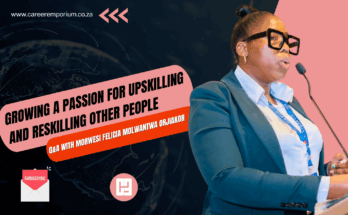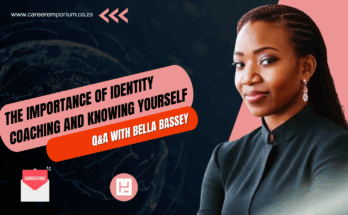When I saw Busisiwe Hlatswayo’s posts on LinkedIn I was so intrigued. They were so bold and unapologetic in terms of her purpose and what she stands for. The energy was everything. I just had to reach out to her because I wanted more and she agreed to a Q&A. She comes with over two decades of diverse experience across the private and public sectors, academia, and beyond. She is a seasoned Leadership Coach, Consultant, facilitator, and trainer. There is more…she is the recipient of the BPM Emerging DEI Leader Award. This Q&A was fire! Here we go.
Sibusiso Nkosi: How did the GPS of life take you towards this great cause of empowering black women in the workplace? What was that push for you?
Busisiwe Hlatswayo: The adage ‘the personal is political’ rings true in my life as a Black South African woman who was raised in poverty. The challenges that came with living in this identity created questions that needed answers. I was blessed with a curiosity and love for learning. Whenever my life posed questions, I found solace in finding answers. These answers, in turn, fueled my resolve to establish this organization. The following questions began to surface as I journeyed through life:
Why do I exude confidence in predominantly Black spaces, yet feel diminished in predominantly white environments like the University and the workplace?
- Why do Black individuals seem to struggle universally, regardless of geographical location or majority/minority status? Could this suggest an inherent inferiority?
- Is there a hidden formula for success in corporate settings beyond mere hard work?
- Despite legislation and declarations of commitment to diversity, equity, inclusion, why do Black African women remain severely underrepresented in top leadership roles?
These questions, and the insights gained from exploring them, propelled me towards action and the founding of this organization.
Sibusiso Nkosi: Why is the topic of black women in the workplace so important, both in SA and globally?
Busisiwe Hlatswayo: Black women face significant challenges in achieving top positions within the workplace. According to reports from the Commission for Employment Equity, Black African women are consistently the least represented in senior and executive roles, with minimal growth recorded annually, often less than 1% since 2018. Positioned at the intersection of gender, race, class, and anti-blackness, Black women endure compounded biases, surpassing those encountered by women of other racial backgrounds.
Stereotypes such as the ‘angry black woman,’ ‘strong black woman,’ and ‘mammy stereotype’ further exacerbate these biases, hindering career advancement and fostering a hostile work environment. Black women are disproportionately subjected to microaggressions, and their wage gap is wider than that of any other demographic.
While challenges exist for all women in the workplace, the experiences of women of colour, particularly Black women, are notably more adverse. Current efforts to combat racism often prioritize issues affecting Black men, while initiatives addressing sexism tend to cater to the needs of white women, leaving Black women’s unique struggles inadequately addressed.
Recognizing the intersectionality of Black women’s experiences is crucial. Effective measures to address racism and sexism must center the specific challenges faced by Black women. By resolving the issues Black women encounter, real advancement in representation will be achieved.
Sibusiso Nkosi: If you can pick top 3 things that we as society need to do to support black women in the workplace, what would they be?
Busisiwe Hlatswayo:
- Education on unconscious biases is paramount, particularly within diversity, equity, and inclusion initiatives. It’s imperative to incorporate a dedicated focus on the unique biases and challenges faced by Black women. We must redefine societal and workplace perceptions of Black women to foster true inclusion.
- Allyship is essential, especially from men in all spheres of life: at home, in society, and within the workplace. True allyship transcends mere mentorship; it entails active sponsorship and a fair distribution of household responsibilities, both within professional and domestic settings.
- To drive meaningful change, we must articulate a clear value proposition centred on advancing Black women. This commitment should be ingrained in organizational strategies, policies, and processes, including leadership compensation structures. Embracing these initiatives will create tangible progress and foster genuine transformation.
Sibusiso Nkosi: Tell us about your work. How are you empowering black women in the workplace?
Busisiwe Hlatswayo: I am a Black women in leadership coach and Founder of Black women in the workplace, a company aimed at helping Black women position themselves for top leadership in the workplace, navigate race and gender bias and be effective leaders in the workplace.
We do this through:
- Leadership coaching – this is one on one coaching to support Black women in corporate.
- Our signature online coaching course called the Reimagined Black women in the workplace program that is specifically designed to support Black women in advancing to – and to be effective in leadership in the workplace.
- We also offer Women in leadership development programs that aims to create a pipeline of women leaders in the workplace.
Sibusiso Nkosi: What are your ultimate tips for black women in the workplace who really want to get things right?
Busisiwe Hlatswayo:
- Gain a deep understanding of the unique challenges that come with your identity as a Black woman in the workplace and seek support to effectively navigate these realities.
- Cultivate a robust personal brand that extends beyond your job role, showcasing your unique strengths and contributions.
- Develop skills to navigate office dynamics and politics with confidence and professionalism.
- Recognize the importance of investing in your career growth and emotional well-being beyond formal education qualifications.
- Prioritize self-care, rest, and play to maintain a healthy work-life balance and sustain your mental health.
I hope you thoroughly enjoyed this Q&A the way I did. I was inspired all the way through. Also, be sure to checkout Black Women in The Workplace. As usual, do not forget to drop a like.
Do not forget to subscribe to our newsletter to have any new article sent to you directly! Sign up for free.




